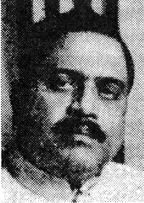Ali, M Korban
Ali, M Korban (1924-1990) lawyer, politician. He was born in 1924 at village Kandipara in Lauhajang thana of Munshiganj district. M Korban Ali obtained his MA degree in Economics in 1947 from Dhaka University. Having obtained his BL degree in 1950 from Dhaka University he joined the Dhaka district bar.

Korban Ali joined the Awami Muslim League in 1950, and was assigned to organise the party in the greater Dhaka district. He had active role in the language movement since its inception in 1948, and was imprisoned during movement in 1952. He was elected the organizing secretary of the central committee of Awami League in 1953 to continue till 1955. Between 1954 and 1958 he was the president of Dhaka district unit of Awami League. M Korban Ali was elected a member of the East Bengal Provincial Assembly in 1954 from Lauhajang-Tongibari constituency as a nominee of the united front. After the promulgation of 92A on 29 May 1954 and the introduction of governor’s rule in the province, he was arrested and kept confined. Between 1955 and 1958 he had been the deputy chief whip of the East Bengal Provincial Assembly.
After the promulgation of martial law in the country on 7 October 1958, Korban Ali was arrested and kept confined for nearly two years. During the anti-Ayub student movement in 1962 he was again arrested for his alleged role in organising the movement. Korban Ali had active role in Six-point movement of Bangabandhu Sheikh Mujibur Rahman since 1966, and in mass upsurge of 1969. Korban Ali was the chief of the election monitoring and publicity cell of Awami League during the general elections of 1970.
Korban Ali had vital role in the Non-Cooperation Movement in March 1971. With the army crackdown on the night of 25 March he along with other Awami League leaders crossed over to India. During the War of Liberation, he was the political adviser to the Acting President of the Mujibnagar Government in exile. After the liberation, Karban Ali was the senior vice president of Bangladesh Awami League during 1972-1974. He was elected a member of the Jatiya Sangsad in 1973 as a nominee of Awami League from Sirajdikhan-Tongibari constituency. He was a member of the cabinet of Bangabandhu Sheikh Mujibur Rahman in 1975 in charge of the Ministry of Information and Broadcasting. With the floating of Bangladesh Krishak Sramik Awami League (BAKSAL), Korban Ali was nominated as a member of the central committee of the Party. After the assassination of Bangabandhu Sheikh Mujibur Rahman on 15 August 1975, Korban Ali along with other Awami League leaders were put behind the bar, and he was kept confined for nearly two years.
In the Jatiya Sangsad elections held in February 1979, Korban Ali contested from the Munshiganj-2 constituency as a nominee a Awami League only to sustain a reverse. He was elected a member of the Awami League presidium in 1981.
M Korban Ali joined the cabinet of the military government of Lt General Hussain Mohammad Ershad in 1984, and was in charge of the Ministry of Jute and Textile, and later in charge of the Ministry of Public Works and Urban Development. Korban Ali, a liberal democratic, non-communal and nationalist political leader has left outstanding contribution towards the cause of struggle for autonomy of the people of this country. He died in Dhaka on 23 July 1990. [Muazzam Hussain Khan]
